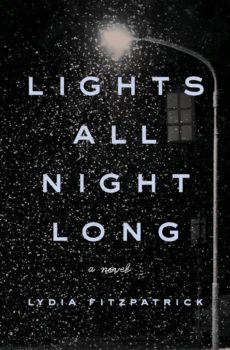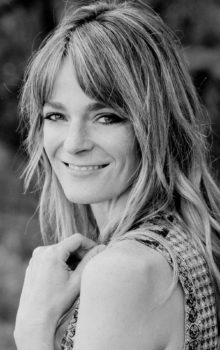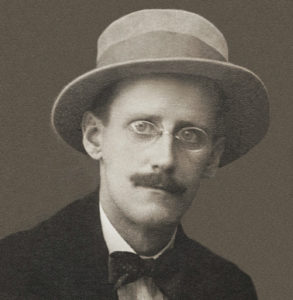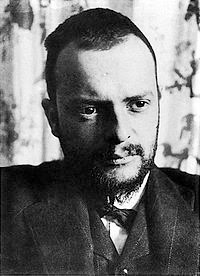 |
| I’m interested in the amount of silence around things. Things you couldn’t talk about: loss, absence’ … COLM TÓIBÍN |
Tuesday, April 30, 2019
Colm Tóibín / ‘There's a certain amount of glee at the sheer foolishness of Brexit’
Monday, April 29, 2019
James Joyce’s Love Letters to His “Dirty Little Fuckbird”
James Joyce’s Love Letters to His “Dirty Little Fuckbird”
An Interview with Lydia Fitzpatrick
 |
| Lydia Fitzpatrick |
An Interview with Lydia Fitzpatrick
"I know I’m on the right track when I’m terrified for a character": Maggie Shipstead talks with Lydia Fitzpatrick about her debut novel, Lights All Night Long, as well as where books begin, leaps of imagination, the momentum of a murder mystery plot, and more.
Lydia Fitzpatrick’s debut novel, Lights All Night Long, can be (and has been) described lots of different ways: as a literary mystery, a coming-of-age story, a quest narrative, a novel of dislocation. All of these are true and yet no single label can capture the way it grips the reader from the get-go, both through the eternal question of what’s-going-to-happen and by establishing an almost painfully empathetic relationship with its protagonist, Ilya.
Ilya is a fifteen-year-old from a grim former mining and gulag town in the northeast of Russia, and the book opens as he arrives in Baton Rouge to meet the family that will host him during his time as an exchange student. The Masons are kind, unworldly, devout, optimistic, and generous. Suffice to say, they’re nothing like the people Ilya’s used to, though he feels an immediate kinship with their mysterious older daughter, Sadie. In Russia, he has left behind his brother, Vladimir, hopelessly addicted to the street drug krokodil and in prison for the murders of three women, and the realization of Ilya’s long-held dream of coming to America is the source of shame and guilt, rather than excitement and possibility.
Fitzpatrick alternates between sections set in Ilya’s present in Louisiana and in his past in his hometown of Berlozhniki. Doing so, she accomplishes the rare feat of making both plotlines and settings equally fascinating—Ilya is so lovable and flawed and real that he can support the story wherever it goes. As he tries to exonerate his brother from afar, scouring his memories for clues, he also must keep living, and so the novel continuously enlarges its scope, just as Ilya finds his life expanding, too.
The consensus out there is that Lights All Night Long (Penguin Press) is nearly impossible to put down once begun, and that was certainly my experience. I was lucky enough to talk to Lydia about her experience writing the book and also how she became the writer who wrote this book.
Interview:
Maggie Shipstead: Let’s start at the beginning. What’s this novel’s origin story?
Lydia Fitzpatrick: A lot of writers have novels in a drawer. I have a dozen different beginnings to this novel in a drawer. In graduate school, I wrote a short story about Sadie, albeit a very different version of her, and the story was published. But I had this sort of nagging feeling that I wasn’t finished with Sadie and her world yet, that there might actually be a novel there. So in the earliest drafts of Lights All Night Long, Sadie was the protagonist—and pregnant. In others, the perspective alternated between her and her mom and J.T. There were a few months when an oil worker on the Deepwater Horizon was involved.
None of these beginnings seemed to have the legs to make it past a hundred pages, though. And then Ilya’s character entered the story. This was not a mystical moment—I am generally against the spiritualization of the writing process. I had intended for Ilya to enter the story, but I hadn’t anticipated being so drawn to him. There was an instant energy to my writing, an eagerness to do it (which is rare for me). So I started exploring his backstory as a way to understand what it was that made me want to write about him, and once I delved into his past, the novel as it exists now began to take shape.
Wow, I’d completely assumed that you started with Ilya, partly because he’s the point-of-view character and partly because—and this is a weird leap—the specificity of the Russia sections somehow made me think the project was sparked by a need to write about Ilya’s crumbling, gritty hometown, which is definitely different from the bits of Russia that most often appear in our culture: onion domes, spies, ballerinas, Moscow nightclubs, etc. I think Berlozhniki is fictional, but had you been to a place like it? What kind of research did you do?
 I think that energy in writing Ilya’s character did come from a need to write about Ilya and his world. I went to Russia as a teenager in the mid-’90s, not long after the collapse of the Soviet Union, and then again in 2008 on a research trip. But I didn’t get north of St. Petersburg on those trips, so Berlozhniki required an imaginative leap and a lot of research. I read political and economic histories of Russia in the ’90s and 2000s. I read memoirs. One Soldier’s War, by Arkady Babchenko, and Travels in Siberia, by Ian Frazier, were two of my favorites, as were Svetlana Alexievich’s oral histories—both as works of art and as research for the novel.
I think that energy in writing Ilya’s character did come from a need to write about Ilya and his world. I went to Russia as a teenager in the mid-’90s, not long after the collapse of the Soviet Union, and then again in 2008 on a research trip. But I didn’t get north of St. Petersburg on those trips, so Berlozhniki required an imaginative leap and a lot of research. I read political and economic histories of Russia in the ’90s and 2000s. I read memoirs. One Soldier’s War, by Arkady Babchenko, and Travels in Siberia, by Ian Frazier, were two of my favorites, as were Svetlana Alexievich’s oral histories—both as works of art and as research for the novel.
Berlozhniki is loosely based on a city in Russia’s northwest called Vorkuta. I often use photos as inspiration and as research, and Donald Weber shot a series in Vorkuta in 2008 that I became obsessed with. A lot of his images found their way into the book’s imagery. Also, a couple of years into the drafting of the novel, Google added the Street View function to the map of Vorkuta (which I had spent a lot of time studying), and I was suddenly able to virtually roam the city. I spent a creepy amount of time doing this, accruing details: the names of grocery stores and what’s for sale in their windows; the particular graffiti (penises, as I’m sure you might guess, are globally popular); the make and model of the cars; and the fact that in June, when the Google car visited Vorkuta, there was still snow melting in the street.
Lights All Night Long has been described as a literary mystery, and I think that’s apt. I love mysteries. In the classic detective format, I love the satisfaction of seeing information come together to reveal a logical whole. I think there’s something very soothing (and sadly unrealistic) about that vision of a decipherable world. But I also think our lives are actually full of mysteries, big and small, and part of what we do every day is try to solve them. I’m curious what that designation means to you—what you think makes something a mystery—and how or if your writing process was informed by it.
I love murder mysteries. I grew up on them. I had close to an hour drive to and from school as a kid, and my mom and I would listen to mysteries constantly—Agatha Christie and Mary Higgins Clark and Sue Grafton and Arthur Conan Doyle and cozies. We were not picky; we’d check out as many per week as the library would allow. And often, after the drive home from school, we’d just keep sitting in her station wagon in the driveway, listening, wanting to get to the end. There was a formula to them that I understood even then, movements to the plot that were comforting in their consistency. The killer was never the first suspect, often the third. He (or, sometimes, excitingly, she) was someone you’d met, however glancingly, in the story.
When I set out to write a novel, I knew that I wanted it to be a mystery on some level, and it was reassuring to know what plot movements that would require, to be able to narrow my focus in that way. In the drafting, the murder mystery plot gave me momentum, it functioned as the novel’s skeleton, and then as the characters and their worlds developed, a larger, more central mystery started to sort of envelop it. Without spoiling the plot, I can say, too, that I was interested in the ways mysteries, their drama, their promise of a discrete solution, can actually blind us to other, more realistic—perhaps more mundane, but no less heartbreaking—threats.
Yes, totally. And I think the fact that we’re all mysteries to each other (and to ourselves, sometimes) is part of what drives us to read and write fiction. There’s always the hope of connection with a person or a character—successful empathy sometimes brings that feeling of solving something. I know you write short stories, too, and thinking of those and also maybe what you’re working on next, do you have a sense of some commonalities underlying your fiction? Like maybe interests and obsessions that creep in when you least expect? But also intentions or goals that you set for your work?
I’m sort of a chameleon writer—the worlds and characters and concerns of my stories vary a lot. But I often find myself writing from a point of fear, which is like the underbelly of empathy. I know I’m on the right track when I’m terrified for a character. Sometimes this fear is the inspiration for the story, more often it emerges as the story comes to a head. Also, I’m obsessed with memory, and the way these infinitesimal little tweaks in what we remember accrue until we’ve created full fictions about our lives and the people in them. Especially when grief is involved, and it becomes even more difficult to untangle the reality of the person loved and lost from what we might have wished of that person.
What kind of advice would you have for writers who are in the early and middle stages of drafting their first novels? Maybe it’s the same question, maybe separate, but what do you wish you’d known?
When I finished the very first draft of the novel, the ending didn’t work. I think there’s a tendency to talk about the writing process in spiritual terms—the muse singing, and the characters leading the way—and so when I hit this not good end of the draft, I felt a little betrayed (ok, more than a little). The muse had messed with me, my characters had led me to a dead end. There followed a very dark period of pulling the novel’s two storylines apart and trying to figure out where exactly I had gone wrong and how I might fix it. This is a long way of saying that there are those moments in writing, those highs that feel almost spiritual, but that the work of writing is in showing up for all the less inspired days, those days when the muse decides to stay in bed.
What’s a piece of culture—book, movie, TV series—that you’ve loved recently? What’s a piece of culture you’re excited to consume?
I just finished Washington Black, by Esi Edugyan, and am in complete awe of it. I love her sentences—their lushness—and the story’s soaring, adventurous spirit that’s grounded by the grit, the texture, of all the settings the novel contains. And there are a lot! And while “excited” doesn’t feel like the appropriate word, I just bought Adam Higginbotham’s Midnight in Chernobyl and am going to dive into it tonight. I loved Voices from Chernobyl, by Svetlana Alexievich, and I’m interested to see what other perspectives Higginbotham’s account offers. Then—full 180 here—there’s the final season of Broad City. I’m so excited about it that I keep not watching it, just cause I’ve managed to convince myself that Abbi and Ilana are my friends, and when it ends, my delusion will have to end with it.
Becoming a writer is a complex process with lots of moving parts, but how do you think about your experiences doing your MFA and your Stegner Fellowship in terms of your development?
 Both my MFA program and the Stegner provided that ultimate luxury: debt-free time to write. I think of writing in terms of that Malcolm Gladwell axiom: it takes 10,000 hours to become an expert. It’s hard to carve out that kind of time around the demands of a full-time job. At Michigan, where I got my MFA, I was fortunate to work with an amazing faculty—Doug Trevor, Michael Byers, Eileen Pollack, Peter Ho Davies, and Nick Delbanco—and I’m still in awe of their ability to read a terrible story (and the vast majority of those early stories of mine were terrible) and find the one thing in it that was slightly less terrible, that was, in fact, worthy of exploration. I wasn’t an English major, so in a sense I learned how to read as a writer at Michigan too. I remember there was this test the first year, and we got this epically long reading list: Anna Karenina and The Good Soldier and Native Son and Moby Dick…it went on and on. I hadn’t read any of them, and I spent the whole winter on nothing but that list, and what a dream winter it was. I had a fellowship at the University of Wisconsin-Madison right out of Michigan, and then a year living in my in-laws’ attic in South Carolina, and by the time I made my way west for the Stegner program, I was working on a very early draft of Lights All Night Long. I workshopped the novel exhaustively during my Stegner years, and it simply wouldn’t exist without the insight from my fellow fellows and the faculty there.
Both my MFA program and the Stegner provided that ultimate luxury: debt-free time to write. I think of writing in terms of that Malcolm Gladwell axiom: it takes 10,000 hours to become an expert. It’s hard to carve out that kind of time around the demands of a full-time job. At Michigan, where I got my MFA, I was fortunate to work with an amazing faculty—Doug Trevor, Michael Byers, Eileen Pollack, Peter Ho Davies, and Nick Delbanco—and I’m still in awe of their ability to read a terrible story (and the vast majority of those early stories of mine were terrible) and find the one thing in it that was slightly less terrible, that was, in fact, worthy of exploration. I wasn’t an English major, so in a sense I learned how to read as a writer at Michigan too. I remember there was this test the first year, and we got this epically long reading list: Anna Karenina and The Good Soldier and Native Son and Moby Dick…it went on and on. I hadn’t read any of them, and I spent the whole winter on nothing but that list, and what a dream winter it was. I had a fellowship at the University of Wisconsin-Madison right out of Michigan, and then a year living in my in-laws’ attic in South Carolina, and by the time I made my way west for the Stegner program, I was working on a very early draft of Lights All Night Long. I workshopped the novel exhaustively during my Stegner years, and it simply wouldn’t exist without the insight from my fellow fellows and the faculty there.
Maggie Shipstead is the New York Times-bestselling author of the novels Astonish Me and Seating Arrangements, which won the Dylan Thomas Prize and the L.A. Times Book Prize for First Fiction. A third novel, Great Circle, will be published in 2021, with a short story collection to follow. She is a graduate of the Iowa Writers’ Workshop and a former Wallace Stegner Fellow at Stanford. A regular contributor to Travel + Leisure, Condé Nast Traveler, and Departures, Maggie has also been published many other places, including Outside, the New York Times, the Washington Post, the Guardian, and The Best American Short Stories, and has twice been a National Magazine Award finalist for fiction.
FICTION WRITERS REVIEWThursday, April 25, 2019
Lucia Joyce / To Dance in the Wake
Lucia Joyce: To Dance in the Wake
Book Review: Lucia Joyce, To Dance in the Wake

I recently read Lucia Joyce: To Dance in the Wake, by Carol Loeb Shloss. It chronicles the life and death of Lucia Joyce, the daughter of literary legend, James Joyce.

I have to be blunt. I was incredibly disappointed with this book. It is one of the most dreadfully boring biographies I have ever read in my life.
I snatched this book up from the library because Lucia Joyce is fabulous. She was a phenomenal dancer whose talent was overshadowed by her brilliant and famous father. Her career was stifled because of a permanent trip to the loony bin.

Lucia is, in fact, such a fiery, dynamic character that it seems almost impossible that someone was able to make her life seem so dry.
The author, Shloss, spent most of her adult life researching the novelist's daughter.
But, that's the problem. This book reads more like a textbook than a biography. And it's NOT a small book.
It even got to the point where I couldn't finish it.
I don't recommend this book.
But, I do want you to know a little bit about Lucia.

Growing up, Lucia was ambitious for fame. She longed to be recognized for her own talents as a dancer, rather than for simply being James Joyce's daughter.
After all, her father was one of the most influential writers in the 20th century. Everyone, even Marilyn Monroe, was obsessed with his work.

Lucia and her father were extremely close. It is even believed that she was the muse for his final novel, Finnegan's Wake.
Life seemed perfect while she was a young adult. She was the daughter of one of the most famous men in the world, she was becoming a well-known dancer in Europe, and she was dating literary genius Samuel Beckett, who was at the time her father's protege.

But, unfortunately, happiness doesn't last forever.
Her mental state began deteriorating and her life began to fall apart. Samuel called off their relationship. She began showing signs of schizophrenia. She had to quit dancing.

Her father became sick with worry and consumed with helplessness. His friends panicked that his daughter's mental breakdown was causing him to lose concentration on his writing.
Believing his work to be more important than his daughter, his wife and son quickly had Lucia hospitalized.

This caused James even more unhappiness and distress. He never believed his daughter was insane. He believed she was merely a free spirit, driven by passion to dance as he was to writing.
But he died before he could save Lucia.
She spent the rest of her life in mental institutions.

Today it is widely believed, especially with the help of Shloss's research, that Lucia might not have been mentally ill, but simply wild-tempered. There are many people who believe she was wrongly imprisoned.
Scary, isn't it?
I feel bad giving this book such an awful review, because the research Shloss did was absolutely incredible. I think the book could be a goldmine for a screenplay. Lucia's life could be an Oscar-worthy film, I would think...
Tuesday, April 23, 2019
Paul Klee / Works
by Paul Klee
+Sure%C3%B1os+(1919).jpg) |
| JARDINES TUNECINOS, 1919 |
 |
| GATO Y PÁJARO |
.jpg) |
| ELLA RUGE, NOSOTROS JUGAMOS, 1928 |
.jpg) |
| CÚPULAS ROJAS Y BLANCAS, 1914 |
.jpg) |
| AD PARNASSUM, 1932 |
 |
| RED BALLOON |
.jpg) |
| CAMINOS PRINCIPALES Y CAMINOS LATERALES, 1929 |
.jpg) |
| MÁQUINA TEMBLOROSA, 1922 |
 |
| Drawn One, 1935 |
 |
| EL MENSAJERO DE OTOÑO |
 |
| LA MÁSCARA |
 |
| SENECIO, 1922 |
 |
| Bogata Przystan |
 |
| EROS |
 |
| AD MARGINEM |
 |
| RECONSTRUCCIÓN, 1926 |
.jpg) |
| REFUGIO, 1930 |
.jpg) |
| SONIDO ANTIGUO, ABSTRACTO EN NEGRO, 1924 |
 |
| NEW HARMONY |
 |
| LA MUERTE Y EL FUEGO |












